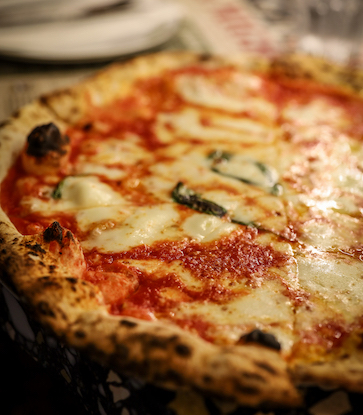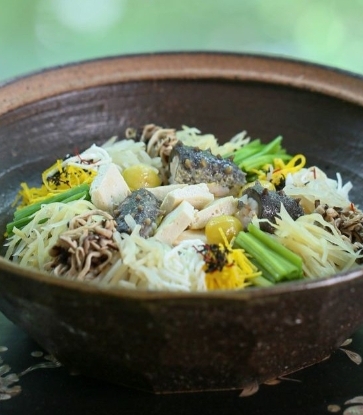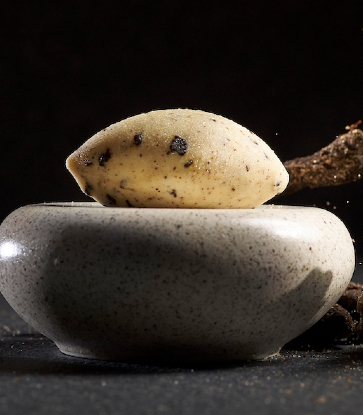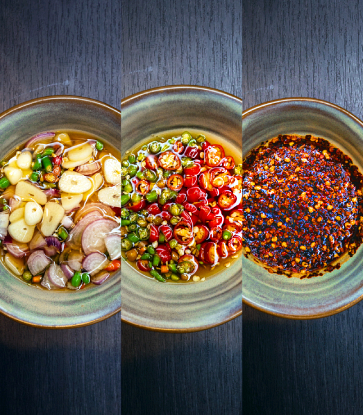Momofuku Noodle Bar in New York City’s East Village is chef/owner David Chang’s first restaurant and also the birthplace of the wildly-addictive pork bun. Since its opening in 2004, Chang has become an international sensation, receiving Michelin recognition and launching numerous restaurants in New York, Washington, D.C., Las Vegas, Toronto, Sydney and, most recently, Majordōmo — a favorite of some chefs — in Los Angeles.
Noodle Bar has served ramen and a roster of seasonally-changing dishes to eaters anticipating its unique genius, sometimes enduring long waits to dine. The restaurant’s shiitake buns are comprised of four major components: steamed buns, quick pickled cucumbers, shiitake mushrooms and tare.
(Pro tip: Fifty buns is a lot. But they keep in the freezer for months without losing any quality, and if you cut the recipe down any more than this, there’s barely enough filling in the bowl of the mixer for the dough hook to pick up. It's best to clear out a couple of hours and freezer space and get to work.)

Momofuku Noodle Bar’s Shiitake Buns
Courtesy of Momofuku Noodle Bar, New York CityMakes 50 buns
Ingredients
For the Bun Dough:
1 tablespoon plus 1 teaspoon active dry yeast
1 1/2 cup water, at room temperature
4 1/4 cup bread flour
6 tablespoons sugar
3 tablespoons nonfat dry milk powder
3 tablespoons kosher salt
1/2 rounded (or heaping) teaspoon baking powder
1/2 teaspoon baking soda
1/3 cup rendered pork fat or vegetable shortening, at room temperature, plus more for shaping the buns, as needed
For the Quick-Pickled Cucumbers:
2 meaty Kirby cucumbers, cut into 1/8-inch-thick rounds
1 tablespoon sugar, or more to taste
1 teaspoon kosher salt, or more to taste
For the Shiitakes:
1/2 pound dried shiitakes
1 tablespoon canola oil
For the Tare:
1 chicken back
1/2 cup sake
1/2 cup mirin
1 cup usukuchi (light) soy
1/3 pound Benton’s bacon, or another very smoky substitute
For Each Bun:
1/2 tablespoon mirin
1 tablespoon hoisin sauce
1 tablespoon green onion, chopped
Method
1. Make the bun dough: Combine the yeast and water in the bowl of a standing mixer outfitted with the dough hook. Add the flour, sugar, milk powder, salt, baking powder, baking soda and fat. Mix on the lowest speed possible, just above a stir, for 8 to 10 minutes. The dough should gather together into a neat, not-too-tacky ball on the hook. When it does, lightly oil a medium mixing bowl, put the dough in it, and cover the bowl with a dry kitchen towel. Put it in a turned-off oven with a pilot light or other warmish place and let rise until the dough doubles in size, about 1 hour and 15 minutes.
2. Prepare the buns to bake: Punch the dough down and turn it out onto a clean work surface. Using a bench scraper or knife, divide the dough in half, then divide each half into 5 equal pieces. Gently roll the pieces into logs, then cut each log into 5 pieces, making 50 pieces total. They should be about the size of a ping pong ball and weigh about 25 grams, or just under an ounce. Roll each piece into a ball. Cover the dough balls with a draping of plastic wrap and allow them to rise for 30 minutes.
3. Shape the buns: Cut out 50 4-inch squares of parchment paper. (Pro tip: measure, fold and trim edges to make many at the same time.) Coat a chopstick with whatever fat you’re working with. Flatten one ball with the palm of your hand, then use a rolling pin to roll it out into a 4-inch-long oval. Lay the greased chopstick across the middle of the oval and fold the oval over onto itself to form the bun shape. Withdraw the chopstick, leaving the bun folded, and put the bun on a square of parchment paper. Stick it back under the plastic wrap (or a dry kitchen towel) and form the rest of the buns. Let the buns rest for 40 to 45 minutes. (They will rise a little.)
4. Steam the buns: Set up a steamer on the stove. Working in batches to avoid crowding, steam the buns on the parchment squares for 10 minutes. Remove the parchment. You can use the buns immediately (reheat them for a minute or so in the steamer if necessary) or allow to cool completely, then seal in plastic freezer bags and freeze for up to a few months. Reheat frozen buns in a stovetop steamer until puffy, soft, and warmed all the way through, 2 to 3 minutes.
5. Pickle the cucumbers: Combine the cucumbers with the sugar and salt in a small mixing bowl and toss to coat. Let sit for 5 to 10 minutes. Taste. If the pickles are too sweet or too salty, put them into a colander, rinse off the seasoning, and dry in a kitchen towel. Taste again and add more sugar or salt as needed. Serve after 5 to 10 minutes, or refrigerate for up to 4 hours. (Makes about 2 cups.)
6. Cook the shiitakes: Add the shiitakes to a pot with enough water to cover them, and bring the water to a simmer. Use a plate to keep the shiitakes submerged in the water (otherwise the shiitakes will float to dry) and boil until tender. Drain the liquid (which Noodle Bar reserves for stocks and soups). Once cool enough to handle, thinly slice the shiitakes. In a cast-iron pan, heat the canola oil over medium heat. Sauté the shiitakes until brown and crisp on both sides, about 6 minutes. (Makes about 2 cups.)
7. Roast the chicken back: Roast the chicken back in the saucepan you’ll later make the tare in. Start it out in a low oven (250°F), so it renders out some fat to cook in. (Or add a tiny bit of oil to the pan and get it going over a medium-high burner.) Crank the oven up to 400°F after a couple minutes. In about 20 minutes, with the occasional prod or flip, you should have a deeply amber-colored chicken back to work with. (Keep cooking until you reach that color.)
8. Make the tare: Remove the chicken back from the pan and deglaze the pan with the sake. Scrape the pan to “release the fond,” or, more plainly, to get all the tasty brown bits off the bottom. Return the chicken to the pan, set it over a medium-hot stove, and add the remaining ingredients. Lower the heat to get the contents of the pot to reach the barest of simmers and cook for 1 hour 30 minutes. The idea is not reduction, but infusion: you want to get all the bacon and roasted-chicken flavor into the liquid.
Strain the solids out of the tare and discard them; put the tare in the fridge to chill. When the fat solidifies and rises to the top, remove it; it can be used (along with additional, supplemental bacon fat) to finish bowls of soup.
9. Assemble each bun: Heat a bun in a steamer on the stovetop. It should be hot to the touch, which will take almost no time with just-made buns, and 2 to 3 minutes with frozen buns. Toss 1/2 cup shiitakes with 2 teaspoons tare and 1/2 tablespoon mirin, per serving. Remove the bun from the steamer and flop it open on a plate.
Slather the inside of the bun with the hoisin sauce using a pastry brush or the back of a spoon. Arrange four slices of pickled cucumbers in the bun on one side of the fold and the seasoned shiitakes on the other. Scatter the shiitakes and pickled cucumbers with chopped green onion, fold closed and voilà: shiitake bun.
Images courtesy of Andrew Bezek.












